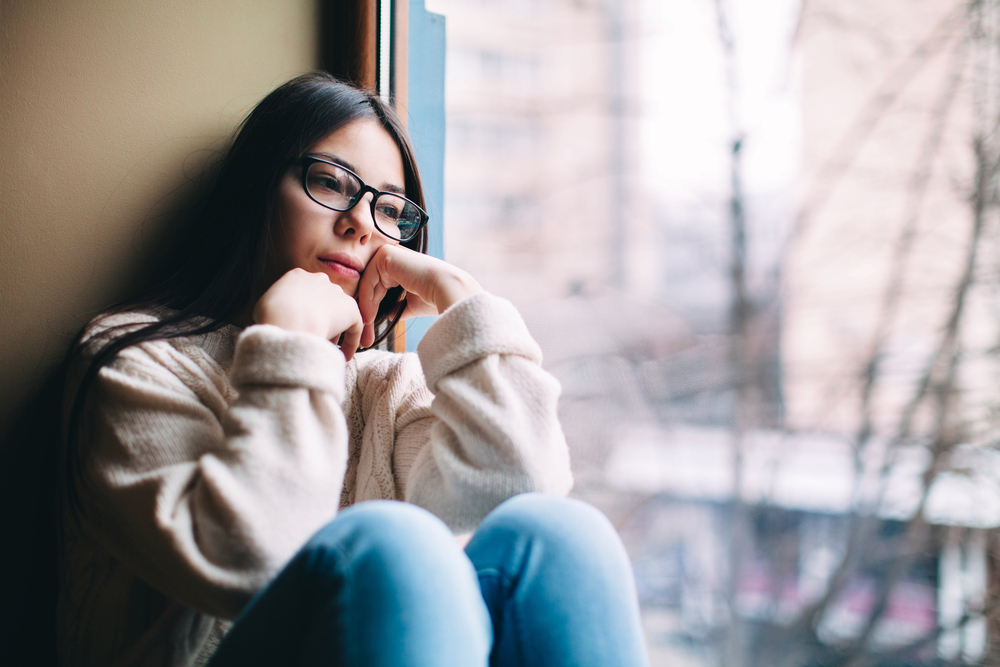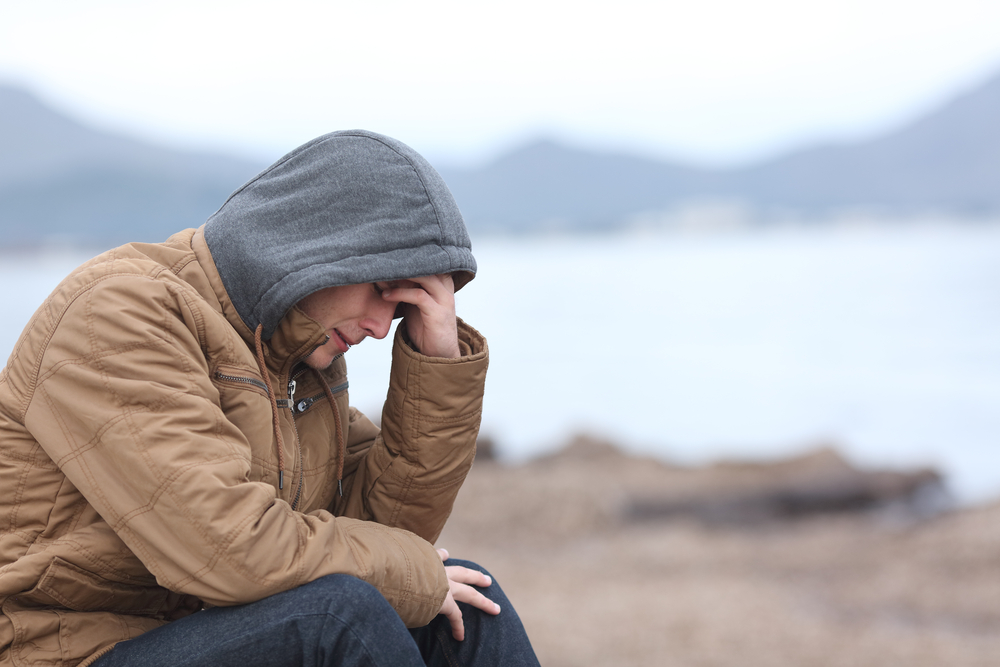
Mark Nazh / Shutterstock.com
It’s normal for college students to feel a bit down in January. The joy and excitement of the holidays fades away, and the reality of a new class schedule and school responsibilities comes into full view. However, for some college students, lack of motivation and feelings of hopelessness in the colder months may point to a bigger issue. If you have noticed a large shift in your mood beginning in the fall and intensifying through winter, you might be experiencing seasonal affective disorder, or winter depression.
What is seasonal affective disorder (SAD)?
According to the Mayo Clinic, “Seasonal affective disorder (SAD) is a type of depression that’s related to a change in seasons; SAD begins and ends at about the same time every year.” While summer SAD does exist, most cases occur during the fall and winter months. Like those with other kinds of depression, winter-onset SAD sufferers often experience the following symptoms:
- Lack of motivation
- Decreased energy
- Feelings of hopelessness
- Weight and appetite changes
- Agitation or restlessness
- Sleep problems
- Decreased interest in activities and social outings
- Difficulty concentrating
- Suicidal thoughts
Please note that if you are having suicidal thoughts, you should seek help immediately. You can call 1-800-273-TALK (8255), the National Suicide Prevention Lifeline, to speak with a trained counselor in your area. The hotline is open 24/7. You may also prefer to reach out to a friend, professor, or staff member at the campus health center, who can help you get help.
What causes seasonal affective disorder/winter depression?
Symptoms of winter depression are thought to be triggered by a decrease in light during the winter months. While the specific cause is yet to be discovered, it is thought that serotonin, a natural chemical in your brain that controls mood, drops in reaction to reduced sunlight. This drop, along with a shift in your body’s level of melatonin (a hormone that promotes sleep), is thought to induce depression.
Why do some college students develop seasonal affective disorder?

Antonio Guillem / Shutterstock.com
Some people are at higher risk for seasonal affective disorder than others. Young people are more likely than older individuals to develop SAD; therefore, it makes sense that many people experience seasonal affective disorder in college. It is also most prevalent among female students and students living far from the equator, although it does affect men and students living in warmer areas. Not surprisingly, a study from Bates College found that students who had moved from “southern latitudes to northern New England were the most likely to experience increased depression in winter.” This means that if you have recently made a similar move—say from Arizona to Boston—you may be at higher risk for SAD than your peers from the North.
Why would I experience seasonal affective disorder in college and not in high school?
You may be experiencing seasonal affective disorder for the first time if you have recently moved to a darker, colder climate. If that is not the case, it could be because your circadian rhythms are out of whack in a way they weren’t when your parents were around. Now that you have full say over when you go to bed and when you wake up, you may be missing prime sunlight in the morning and ZZZs at night, making your symptoms more noticeable than ever before.
It is also possible that you are experiencing a depression that is not related to the seasons. College students are exposed to a lot of new academic, social, and physical stressors in the first year of school. If you are struggling to develop healthy coping strategies, it’s important to take time to get evaluated by a mental health professional.
Where can I go to receive help for seasonal affective disorder at college?
Seasonal affective disorder and other forms of depression need to be diagnosed by a doctor. Schedule a physical with your family doctor or an appointment at your school’s health center so they can rule out other medical conditions that might be causing your symptoms. Most college campuses also have counseling centers where students can talk with mental health specialists. Call ahead to make an appointment or see if they have walk-in hours. If you are grappling with embarrassment or are nervous to see someone, know that there are many other college students with the same symptoms as you. According to a study by the American College Counseling Association (ACCA), 35.3% of college students surveyed in 2015 said they had experienced severe depression in the last 12 months. Another 57.7% reported feeling incredibly anxious.
What is the treatment for seasonal affective disorder?
Light therapy is one of the most common treatments for SAD. Patients who are prescribed the treatment are asked to purchase (or borrow from a school counseling office) a recommended light therapy box to sit in front of on a daily basis. Mimicking natural light, the light box is thought to increase and regulate the chemicals in the brain that control mood and thus, decrease the symptoms of seasonal affective disorder. There are very few side effects, but it is important to discuss light therapy with a medical professional before beginning the practice.
Other treatment options include antidepressant medication and psychotherapy. A therapist can help you figure out the actions and thought patterns that may be aggravating your seasonal affective disorder and can help you come up with a plan for managing stress and coping with SAD.
Are there things I can do to help myself with winter depression in addition to the other treatments listed?
Dr. Norman E. Rosenthal, the psychiatrist and researcher who named the disorder and developed light therapy treatment, recommends the following actions:
- Add more light to your dorm or apartment. Open the shades! Bring in more lamps or other lighting fixtures. Create the feeling of summer light even when it’s months away.

Uber Images / Shutterstock.com
- Buy an alarm that wakes you up with light. Try something like this IPEAK alarm clock to wake you up gradually with the semblance of natural light, or buy a timer that turns a lamp on in your room thirty minutes before you want to wake up.
- Exercise during the brightest part of the day. Get outside for a walk or a run even when it is cold. For other ideas of winter outdoor exercise, read “Eight Ways to Stay Fit during the Winter Months without Hitting the Gym”.
- Plan social outings. It’s hard to find motivation to go out on a cold winter day, but making an effort to see friends is well worth your time. If you are really struggling to leave your dorm or apartment, invite friends to your place even if don’t have time to clean up. Your good friends won’t mind, and you will benefit from some social interaction.
Seasonal affective disorder is a serious illness and should be treated as such. There is no shame in seeking help from a medical professional and letting trusted family and friends know that you are struggling. If you need additional resources to help you through a tough time, consider these hotlines:
For everyone:
- Crisis Call Center
- Call 1-800-273-8255 toll-free or text ANSWER to 839863 (standard data rates apply).
- Helpline is open 24 hours a day, seven days a week.
- National Institute of Mental Health
- Call 1-866-615-6464 toll-free.
- Helpline is open Monday through Friday from 8:30 a.m. to 5:00 p.m. (EST).
- The Samaritans
- Call 212-673-3000 toll-free.
- Helpline is open 24 hours a day, seven days a week.
- Calls are confidential and anonymous. Caller ID is not used.
For Spanish speakers:
- El Instituto Nacional de Salud Mental (National Institute of Mental Health)
- Llame 1-866-615-6464 sin cargo.
- La línea de ayuda está abierta de lunes a viernes de 8:30 a 17:00 (EST).
For teens and adolescents:
- Thursday’s Child
- Call 1-800-872-5437 toll-free.
- Helpline is open 24 hours a day, seven days a week.
For LGBT+ youth:
- The Trevor Project
- Call 1-866-488-7386 toll-free. Chat and text options are also available.
- Helpline is open 24 hours a day, seven days a week.
-
What Recent Flooding in Louisiana Can Teach You
-
Preparing to Leave for College with a Chronic Illness
-
How to Respond to Cyberbullying
-
Why Everyone Should Get Counseling at Least Once in Their Life
-
The Importance of Physical Education and Exercise
-
What to Do After You’re Mugged
-
Surviving Homesickness as a Freshman in College
-
Six Ways to Cope if You’re Feeling Overwhelmed in College
-
Everything You Need to Know about Date Rape Drugs
-
Getting Nutrients from Your Meal Plan
-
How to Help a Friend with a Drug or Alcohol Dependency
-
Yoga for Detoxing from the Weekend


